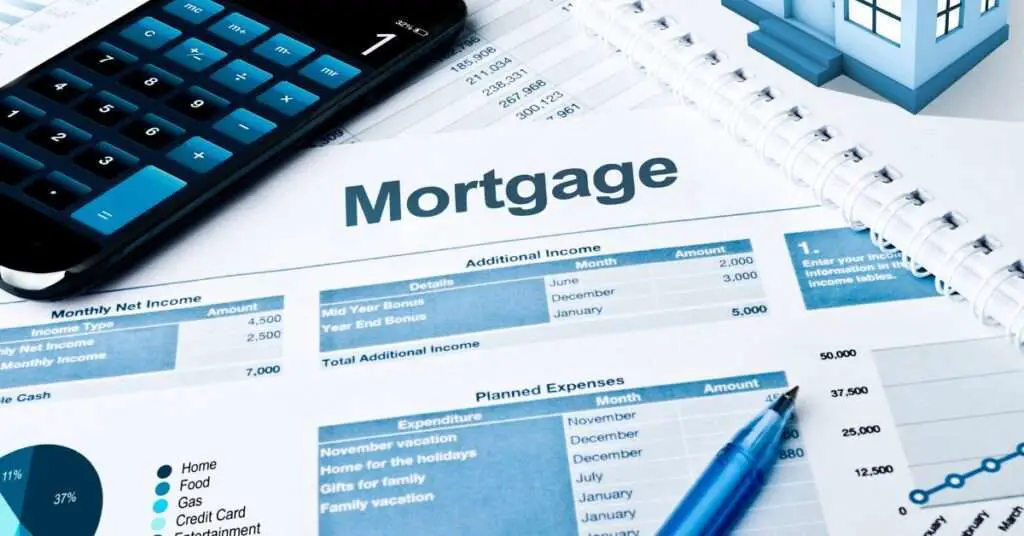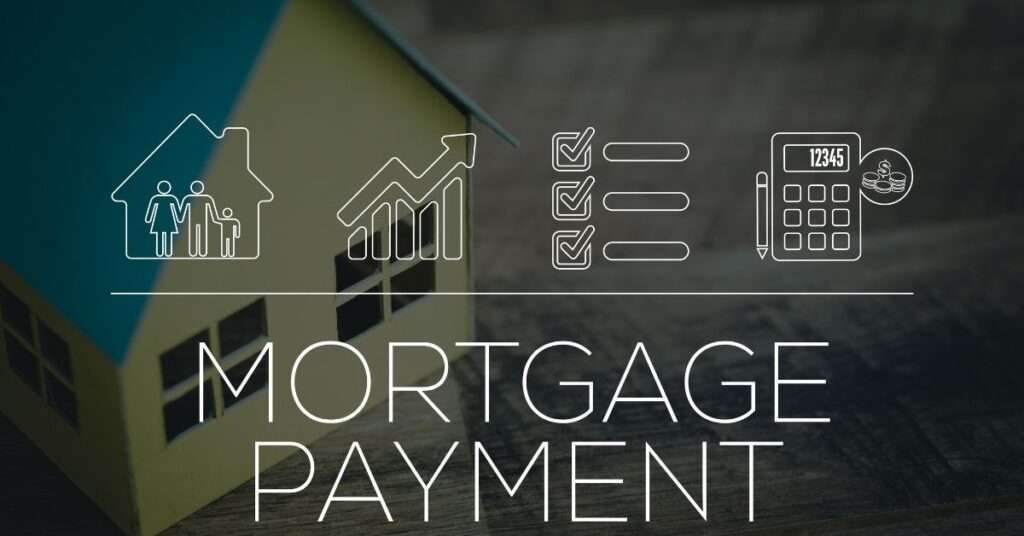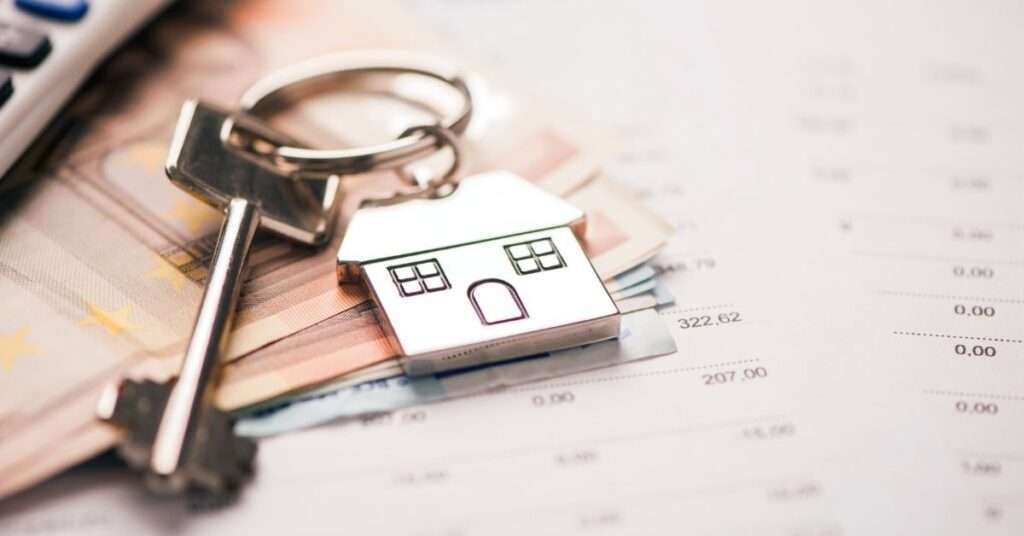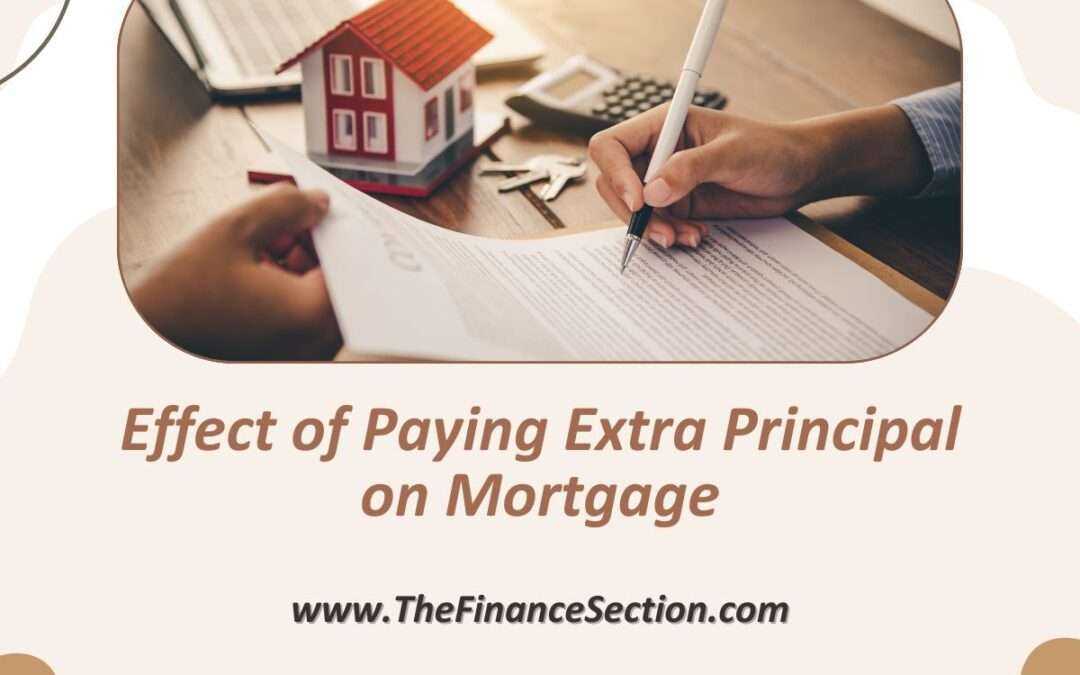The Basics: What is Morgage and Principal on a Mortgage?
In this post, you’ll find out that what is the effect of paying extra principal on mortgage. A Mortgage is like a special kind of loan you get to buy a house. It’s like borrowing a big chunk of money from the bank, and then you pay them back little by little over a long time, usually 15 to 30 years.

Principal on a Mortgage is the amount of that big chunk of money you initially borrowed to buy the house. If you borrowed $200,000 to buy your house, your principal is $200,000. It’s like the heart of your mortgage loan.
Let’s dive a bit deeper into the royal court of Mortgages. The reigning monarch here is the principal – the original loan amount. The borrowed $200,000 to buy your dream home in the financial kingdom, that sum is your principal.
The court jester in this kingdom? Interest. This mischievous character is the cost of borrowing the principal. It’s akin to the lender’s invoice for the privilege of using their money. Instead of sending a thank you note, you’re sending them more money.
Now, let’s bring this concept to life with some examples. Imagine buying a car, let’s say a Tesla Model 3, for $40,000. You borrow that sum from the Bank of Mom and Dad (don’t we wish?). That $40,000 is your principal. But your parents aren’t running a charity, so they charge you interest. Ouch!

What if Apple, the tech giant, borrowed $1 billion to build a new spaceship campus? That colossal amount is their principal. And just like you, they have to pay interest on it. But instead of sending money to Mom and Dad, they’re sending it to their investors. Double ouch!
Think about it this way: If you had invested $10,000 in Microsoft’s initial public offering (IPO) in 1986, your shares would have been worth over $18 million by 2023. Now imagine that $18 million is your principal on a luxury mansion loan. That mansion-sized loan is your principal, and every penny of interest you pay on it is the price for borrowing that money.

In essence, the principal is the heart of your loan, whether you’re buying a Tesla or a tech campus. Understanding this key concept is your first step in navigating the financial kingdom.
And remember, you have to keep an eye on the court jester, interest, who can quickly turn your borrowing festivities into a financial hangover.
So, the next time you borrow, think about your principal and the interest. And send a thank-you card to your lender, it could be cheaper!
Understanding Early Principal Payments
If the “principal” on a mortgage is the king, “early principal payments” are the bold knights who march ahead to tackle the debt dragon sooner. It’s like telling your lender, “Here, take my gold now!” You’ve lost a chess piece, right? But it’s all part of a clever strategy.
Paying more principal now is like trimming the thorns off your debt rose early. It may sting a bit, but it clears the path for a smooth stroll in your financial garden later. It’s the fiscal equivalent of eating your veggies now so that you can enjoy dessert guilt-free later.

So, picture this. You’re the proud owner of a small bookstore. You owe the Bank of Good Reads $50,000 to stock your shelves. That’s your principal. But then, you host a massive, once-in-a-lifetime sale and earn an extra $10,000. You decide to make an early principal payment. Like adding a plot twist to a novel, this move changes your financial story!
Now imagine the retail giant Amazon had a mortgage for their colossal headquarters. Suppose they decided to pay an extra $1 million each month towards their principal (pocket change for them, right?). Just like you, they’d reduce their debt sooner and save on interest. A victory for both the little bookstore and the retail titan!
Early principal payments are like a secret weapon in your financial arsenal. They might seem like a sacrifice now, but they can help you conquer your mortgage sooner, leaving you free to enjoy your financial kingdom in peace.
So, next time you find extra gold in your coffer, why not consider an early principal payment? It could be a game-changer!
The Impact of Paying Extra Principal: “What if” Scenarios
So, you’ve become the CEO of a business named “My Mortgage.” It sounds pretty cool. Should you accept it, your mission is to obliterate that mortgage ASAP.
Let’s dive into what that extra $100 per month can do to your $200,000 mortgage with a 4% interest rate. You’d knock almost four years off your mortgage term! It’s like finishing a marathon before you even break a sweat. Who wouldn’t want that?
But let’s not stop there. Let’s stir in some more real-life examples to make this concept more relatable. Picture this: you’re the owner of a hip, a new startup called “Avocado Toast Unlimited.” You’ve been so successful selling overpriced avocado toast to millennials that you’ve got a mortgage on a swanky new downtown office.
But instead of simply enjoying your green, you decide to drop an extra $500 on your mortgage each month. What happens? You own your hip office outright years earlier, leaving greener in your pocket for avocados.
Now, let’s get a bit crazier. What if you’re Elon Musk, and SpaceX suddenly decided to add an extra $10 million to their billion-dollar mortgage every month? We’d probably see the SpaceX campus owned outright sooner than a Starship reaches Mars!
Paying extra principal on your mortgage is a super strategy that can save you years of payments and potentially thousands in interest. So why wait? As the CEO of My Mortgage, the power to control your mortgage destiny is in your hands!
Key Takeaways and Actionable Advice
Paying extra principal on a mortgage is like adding spinach to your diet. It might not be tasty now, but your future self will thank you. You’ll save on interest and be mortgage-free sooner.
Why not try it? Start small. Add a bit extra to your next mortgage payment. Just like spinach, you might find you like the benefits!

Remember, always consult with a financial advisor before making big financial decisions. They’re like personal trainers for your money. They might not make you do burpees, but they’ll help you get your finances in shape!
So, readers, the ball is in your court. Will you start paying more toward your mortgage principal? Let me know in the comments below!
FAQs
What happens if I pay extra principal on my mortgage?
Paying extra principal on your mortgage does three main things:
1. Reduces the Loan Term: By making additional payments towards your principal, you’re essentially speeding up the process of paying off your mortgage. This could lead to you becoming mortgage-free years earlier, depending on the amount you pay extra and how often you do it.
2. Saves Money on Interest: The more you owe, the more interest you pay. So, by reducing the amount you owe faster, you also decrease the amount of interest accumulating over time.
3. Increases Home Equity Faster: Every dollar you pay towards your principal is a dollar of equity – the part of the home you truly own. By paying extra principal, you’re building up this equity at a faster pace.
Remember, every bit helps. Even a small amount, when paid regularly, can have a big impact over time. It’s like dieting – cutting out just one soda daily can lead to substantial weight loss over a year. It’s the same principle here, but instead of losing weight, you’re losing debt!
Please note: Before making additional principal payments, check with your lender to ensure there are no prepayment penalties and that the extra payments are applied correctly to your principal.
Is it smart to pay extra on your mortgage?
Deciding to pay extra on your mortgage can be smart, but it also depends on your overall financial situation. Here are some points to consider:
1. Interest Savings: By paying extra on your mortgage, you can save considerable money on interest over the life of the loan. This can also shorten your loan term, meaning you’ll own your home outright sooner.
2. Building Equity: Additional payments towards your principal can help you build equity in your home faster. This can be beneficial if you plan to sell the house down the road or consider a home equity loan or line of credit.
3. Financial Priorities: It’s important to weigh this strategy against your other financial goals. If you have high-interest debt (like credit card debt), it might be wiser to pay that off first. Additionally, you still need to save adequately for retirement. That might be a better use of extra funds.
4. Emergency Fund: Before paying extra on your mortgage, ensure you have a sufficient emergency fund. Life can throw curveballs, and having money set aside for unexpected expenses is essential.
5. Loan Restrictions: Check your loan agreement first. Some lenders impose penalties for early repayment or only accept extra payments at specific times.
Everyone’s financial situation is different, so it’s smart to consult with a financial advisor to ensure this strategy fits well within your overall financial plan.
Is it better to pay the extra principal monthly or yearly?
Whether to pay extra on your mortgage principal monthly or yearly can depend on several factors:
1. Interest Savings: Paying extra principal monthly can lead to greater interest savings over the life of the loan. This is because the interest on your mortgage is typically calculated monthly, so reducing your principal balance more often can result in less interest accrual.
2. Budgeting: On the other hand, making a lump sum extra payment yearly might be easier on your budget, particularly if you receive an annual bonus or tax refund that you’d like to put towards your mortgage.
3. Loan Restrictions: Be sure to review your loan agreement. Some mortgages have prepayment penalties or may only allow extra payments at certain times.
4. Financial Goals: Consider your other financial priorities. If you have higher-interest debt or need to meet retirement savings goals, those may take precedence over extra mortgage payments.
Remember, there’s no one-size-fits-all answer to this question. The best approach can vary based on your individual financial situation and goals. It can be beneficial to consult with a financial advisor to determine the most advantageous strategy for you.
Do extra principal payments affect amortization?
Yes, making extra principal payments can indeed affect your mortgage’s amortization. Here’s how:
1. Accelerates Payoff: Extra principal payments can accelerate your loan payoff by reducing the principal balance faster than scheduled. This leads to you owning your home outright sooner than expected.
2. Reduces Interest: Since interest is calculated based on the outstanding principal, reducing the principal faster means less total interest paid over the life of the loan.
3. Changes Amortization Schedule: With extra principal payments, your amortization schedule adjusts. Your loan’s end date moves closer, but your mandatory monthly payment amount typically remains the same (assuming it’s a fixed-rate mortgage). The difference is that more of each payment goes toward the principal rather than interest.
Remember, before making extra payments, it’s wise to ensure there’s no prepayment penalty in your loan agreement and that you’re meeting other financial goals like retirement savings or high-interest debt payoff.
What is a mortgage pay-down principal calculator?
A mortgage pay-down principal calculator is a tool that can prove to be an asset for homeowners. Let’s unpack this.
Firstly, the calculator is all about helping homeowners see the future, at least financially. To calculate the impact of making additional payments towards your mortgage’s principal.
When you punch in your mortgage details and the amount of extra payment, this tool unveils the potential future: how much sooner you might be free of your mortgage and how much interest you could save over time.
Flexibility is its middle name. This calculator allows you to explore various scenarios, such as making extra payments monthly, yearly, or even a one-time bonus payment. Talk about a choose-your-own-financial-adventure!
Don’t be put off by the thought of another complicated financial tool. These calculators are user-friendly. All you need is the most basic information about your mortgage—loan amount, interest rate, term, and the extra payment amount you’re considering.
For instance, imagine you have a $200,000 mortgage with a 4% interest rate, and you’re mulling over adding an extra $100 to your monthly payments. You input these figures into a mortgage pay-down calculator, and voila! You can see how much quicker you could kiss your mortgage goodbye and how much you might save in interest.
Though this tool can feel like a crystal ball into your financial future, consulting with a financial advisor is always a savvy move. This ensures you can tailor a mortgage strategy that fits your specific situation because, after all, personal finance is just that – personal.

